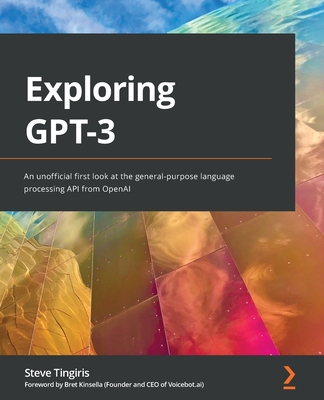Cloud-Native Observability with OpenTelemetry: Learn to gain visibility into systems by combining tracing, metrics, and logging with OpenTelemetry
Boten, Alex
- 出版商: Packt Publishing
- 出版日期: 2022-05-04
- 售價: $1,590
- 貴賓價: 9.5 折 $1,511
- 語言: 英文
- 頁數: 386
- 裝訂: Quality Paper - also called trade paper
- ISBN: 1801077703
- ISBN-13: 9781801077705
-
相關分類:
大數據 Big-data、雲端運算
立即出貨 (庫存=1)
買這商品的人也買了...
-
 Computer Vision: Models, Learning, and Inference (Hardcover)
Computer Vision: Models, Learning, and Inference (Hardcover)$3,300$3,135 -
 $1,373Reactive Programming with RxJava: Creating Asynchronous, Event-Based Applications
$1,373Reactive Programming with RxJava: Creating Asynchronous, Event-Based Applications -
 Living Documentation: Continuous Knowledge Sharing by Design (Hardcover)
Living Documentation: Continuous Knowledge Sharing by Design (Hardcover)$2,010$1,910 -
 $2,402Practical Natural Language Processing: A Comprehensive Guide to Building Real-World Nlp Systems (Paperback)
$2,402Practical Natural Language Processing: A Comprehensive Guide to Building Real-World Nlp Systems (Paperback) -
 Exploring GPT-3: An unofficial first look at the general-purpose language processing API from OpenAI (Paperback)
Exploring GPT-3: An unofficial first look at the general-purpose language processing API from OpenAI (Paperback)$2,120$2,014 -
 Strategic Monoliths and Microservices: Driving Innovation Using Purposeful Architecture
Strategic Monoliths and Microservices: Driving Innovation Using Purposeful Architecture$1,600$1,520 -
 $1,892Software Telemetry: Reliable Logging and Monitoring
$1,892Software Telemetry: Reliable Logging and Monitoring -
 $2,024Learning Domain-Driven Design: Aligning Software Architecture and Business Strategy (Paperback)
$2,024Learning Domain-Driven Design: Aligning Software Architecture and Business Strategy (Paperback) -
 PostgreSQL 14 Administration Cookbook: Over 175 proven recipes for database administrators to manage enterprise databases effectively
PostgreSQL 14 Administration Cookbook: Over 175 proven recipes for database administrators to manage enterprise databases effectively$2,220$2,109 -
 $2,146Introduction to Algorithms, 4/e (Hardcover)
$2,146Introduction to Algorithms, 4/e (Hardcover) -
 $1,910Software Mistakes and Tradeoffs: How to Make Good Programming Decisions (Paperback)
$1,910Software Mistakes and Tradeoffs: How to Make Good Programming Decisions (Paperback) -
 Basic Math & Pre-Algebra All-In-One for Dummies (+ Chapter Quizzes Online)
Basic Math & Pre-Algebra All-In-One for Dummies (+ Chapter Quizzes Online)$1,620$1,539 -
 The DevOps Career Handbook: The ultimate guide to pursuing a successful career in DevOps
The DevOps Career Handbook: The ultimate guide to pursuing a successful career in DevOps$1,575$1,496 -
 $1,888Observability Engineering: Achieving Production Excellence (Paperback)
$1,888Observability Engineering: Achieving Production Excellence (Paperback)
商品描述
Leverage OpenTelemetry's API, libraries, tools and the collector to produce and collect telemetry along with using open-source tools to analyze distributed traces, check metrics and logs, and gain insights into application health
Key Features
- Get to grips with OpenTelemetry, an open-source cloud-native software observability standard
- Use vendor-neutral tools to instrument applications to produce better telemetry and improve observability
- Understand how telemetry data can be correlated and interpreted to understand distributed systems
Book Description
Cloud-Native Observability with OpenTelemetry is a guide to helping you look for answers to questions about your applications. This book teaches you how to produce telemetry from your applications using an open standard to retain control of data. OpenTelemetry provides the tools necessary for you to gain visibility into the performance of your services. It allows you to instrument your application code through vendor-neutral APIs, libraries and tools.
By reading Cloud-Native Observability with OpenTelemetry, you’ll learn about the concepts and signals of OpenTelemetry - traces, metrics, and logs. You’ll practice producing telemetry for these signals by configuring and instrumenting a distributed cloud-native application using the OpenTelemetry API. The book also guides you through deploying the collector, as well as telemetry backends necessary to help you understand what to do with the data once it's emitted. You’ll look at various examples of how to identify application performance issues through telemetry. By analyzing telemetry, you’ll also be able to better understand how an observable application can improve the software development life cycle.
By the end of this book, you’ll be well-versed with OpenTelemetry, be able to instrument services using the OpenTelemetry API to produce distributed traces, metrics and logs, and more.
What you will learn
- Understand the core concepts of OpenTelemetry
- Explore concepts in distributed tracing, metrics, and logging
- Discover the APIs and SDKs necessary to instrument an application using OpenTelemetry
- Explore what auto-instrumentation is and how it can help accelerate application instrumentation
- Configure and deploy the OpenTelemetry Collector
- Get to grips with how different open-source backends can be used to analyze telemetry data
- Understand how to correlate telemetry in common scenarios to get to the root cause of a problem
Who This Book Is For
This book is for software engineers, library authors, and systems operators looking to better understand their infrastructure, services and applications by leveraging telemetry data like never before. Working knowledge of Python programming is assumed for the example applications that you’ll be building and instrumenting using the OpenTelemetry API and SDK. Some familiarity with Go programming, Linux, and Docker is preferable to help you set up additional components in various examples throughout the book.
作者簡介
Alex Boten is a senior staff software engineer that has spent the last ten years helping organizations adapt to a cloud-native landscape. From building core network infrastructure to client mobile applications and everything in between, Alex has first-hand knowledge of how difficult troubleshooting distributed applications is. This led him to the domain of observability and to contributing to related open source projects.An approver and maintainer in several OpenTelemetry projects, Alex has helped implement and evolve the project from its early days in 2019 into the massive community effort that it is today. Alex has contributed to the Python and Go OpenTelemetry implementations, as well as to the specification and the collector projects.More than anything, Alex by codeboten on Twitter loves making sense of the technology around us and sharing his learnings with others.
目錄大綱
1. History and concepts of OpenTelemetry
2. OpenTelemetry Signals: Tracing, Metrics & Logging
3. Auto instrumentation
4. Distributed tracing - tracing code execution
5. Metrics - recording measurements
6. Logging - capturing events
7. Instrumentation libraries
8 .OpenTelemetry Collector
9. Deploying the collector
10. Configuring a backend
11. Diagnosing problems
12.v Sampling strategie
















